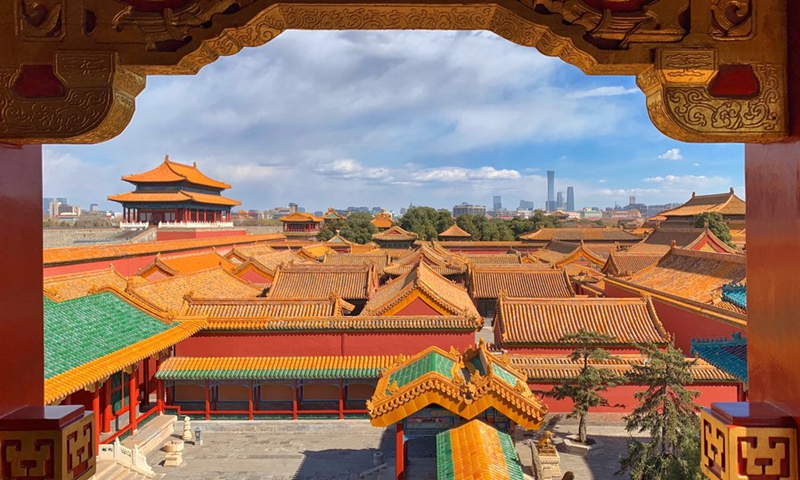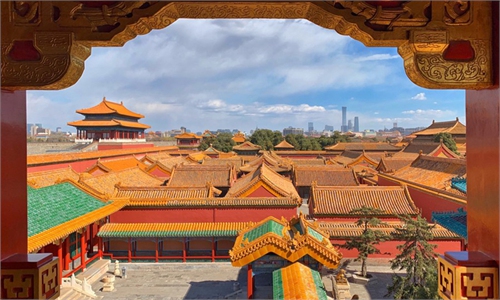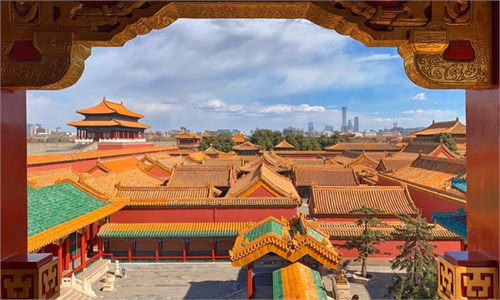
Mobile photo shows the Palace Museum in Beijing, capital of China, March 14, 2019.(Photo: Xinhua)
Twenty years ago, a comprehensive national research project was launched to explore the origin and early development of Chinese civilization. Retrospectively, the project has made remarkable achievements. Recently, Xi Jinping, general secretary of the CPC Central Committee, praised the project for "putting forward its own definition of civilization and its solution to develop a more civilized world, which has made creative contributions to the research on tracing the origins of the world civilization."
Culture and civilization reflect the spirit and identity of a country and nation. The 10,000-year cultural history and more than 5,000 years of civilizational history of China put flesh on how a sense of community among the Chinese people is developing and how Chinese people of all ethnic groups are united in diversity. These are the cultural resources and heritages on which the path of Chinese modernization and the new form of human civilization are based.
History is a textbook for people to learn from and a mirror to better see the world. Xi emphasized the need to establish a "grand historical perspective," and the in-depth study of the history of Chinese civilization is precisely one of what this perspective entails. The Chinese civilization epitomizes the common values of humanity, which embodies traditional narratives such as Under Heaven (Tianxia) and harmonious coexistence of man and nature.
In the face of the increasing instability and uncertainty in today's world, all countries should comprehend the evolution of the world order and human development from the long history and the tide of the times. Bearing history in mind, global villagers must subscribe to mutual appreciation rather than a clash of civilizations, and jointly promote the building of a community of shared future for mankind.
China's fine traditional culture reflects the wisdom and essence of Chinese civilization. It can provide useful insights for governance and moral construction. One of the common elements that open the way to understanding China, the Chinese people, the Communist Party of China and the Chinese nation is traditional Chinese culture, or put more specifically, the fine part of it.
In the midst of world culture interplay, Chinese culture has stood the test of history and changes in the external environment. Its inclusiveness and openness have become even more unwavering. The reason why Chinese culture is so colorful and profound lies in its inclusive nature.
China has had its place and influence in the world, not through militarism or hegemony, but through the powerful appeal and attractiveness of Chinese culture.
As the Resolution of the CPC Central Committee on the Major Achievements and Historical Experience of the Party over the Past Century points out: Confidence in one's culture, which is a broader, deeper, and more fundamental form of self-confidence, is the most essential, profound, and enduring source of strength for the development of a country and a nation.
Strengthening cultural confidence is a systematic project. First, further measures should be taken to improve the institutional mechanism of protecting and discovering traditional culture, and empower the inheritance and dissemination of it. It is advisable to strengthen the construction of "beautiful village" in rural areas to increase the people's sense of cultural participation and belonging. As one of society's main agents of change and progress, the young generation should be better equipped with traditional cultural knowledge, e.g., by putting more efforts on thematic educational activities.
Second, with cultural exchanges going from strength to strength, China's soft power will increase. Actively participating in the cultural exchange is an important means to enriching one's own culture. For example, cultural communication and think tanks dialogue are an integral part of cooperation among countries along the Belt and Road Initiative.
Third, Chinese culture makes contributions of Chinese solutions to global governance. By virtue of Chinese culture's ability to keep pace with the times, China has recently proposed the Global Development Initiative and the Global Security Initiative, respectively, to put forward answers to the current development and security deficits in global governance.
The world is facing major changes unprecedented in a century, and the global pandemic has wreaked havoc disproportionately on vulnerable people. Various social trends are competing fiercely, populism, deglobalization and xenophobia are on the rise, and the principles of the UN Charter and multilateralism are being challenged. In this context, the history of Chinese civilization and the common values of humanity embedded in it will hopefully provide useful vision to better develop international cooperation and improve global governance structures in the post-pandemic era.
The author is associate professor with Central Compilation and Translation Bureau. opinion@globaltimes.com.cn


